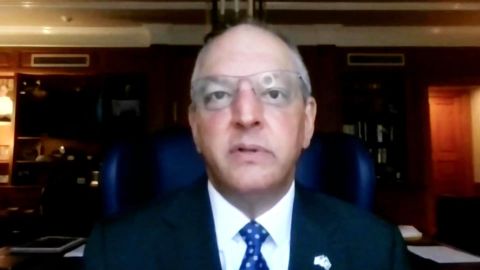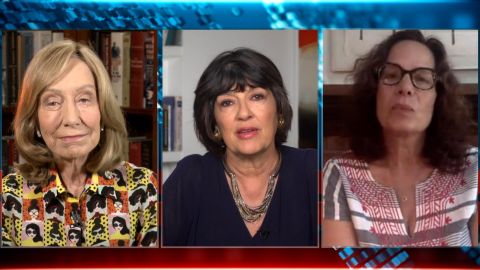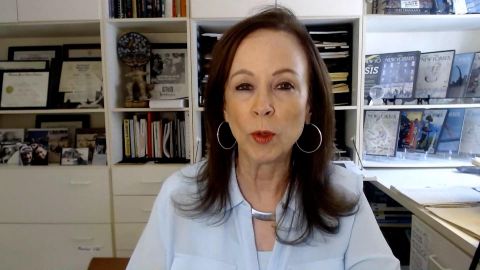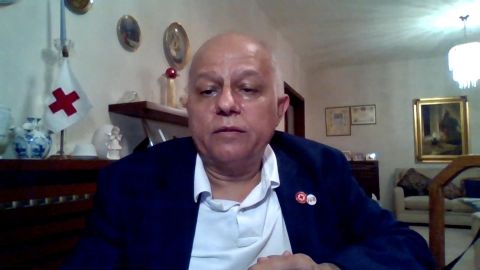Read Transcript EXPAND
CHRISTIANE AMANPOUR: We turn now to Louisiana which is experiencing its worst COVID surge yet with an all-time high in hospitalizations. While the vaccination rate in Louisiana is among the lowest in the country, it is also now rising. Democratic Governor John Bel Edwards has reinstated a mask mandate in an effort to cure infections. And here he’s talking to our Walter Isaacson about wrestling with the COVID crisis and what good government can do.
(BEGIN VIDEO CLIP)
WALTER ISAACSON: Thank you, Christiane. And Governor John Bel Edwards, welcome to the show.
GOV. JOHN BEL EDWARDS (D- LA): Thank you very much, Walter. It’s good to be with you.
ISAACSON: Louisiana is one of the worst hotspots now, more than 2,112 people are in the hospital. Tell us what’s the latest.
EDWARDS: Well, first of all, unfortunately, we’re not one of the hottest spots. We are the hottest spot. As measured by the seven-day case rate. And quite frankly, it is not even close. Just the rate of growth in cases, which is fueling the hospitalization, as you mentioned, then that 2,112 that we have admitted inpatients across State of Louisiana dealing with COVID, that is the highest number throughout the pandemic. And what’s really most concerning right now, Walter, is that the percent positivity of our test continues to increase. Today, we’re going to announce the percent positivity here is 15.4 percent. Last week it was 13.2 percent. By the way, it hasn’t been that high in over a year. And when it was higher, it was with 20 percent as many tests being conducted, almost all of which were being done in emergency rooms early in the pandemic last year. Well, we’re now testing half a million people a month. And we have that kind of positivity. And what we know is the first indicator that you are reaching the crest of the surge will be when that percent positivity levels off. And then, of course, we need it to go down. And so, even though we have the worst numbers in the country, the worst numbers we’ve experienced in the pandemic, there is nothing on the horizon yet to indicate that things are about to get better. Which is why we have reinstated the mask mandate. To mirror the CDC recommendations for people five and over, and that includes our K to 12 schools, it includes higher education. And this is for indoor public settings. Because we have to curb transmission. This delta variant has been a real game changer. And quite frankly, we didn’t do a good enough job of getting enough people vaccinated in the time that we had before this fourth surge really got started in earnest. And we are now paying the price. We’re playing catchup as best we can. And the only good news I can report to you, Walter, is that over the last three weeks, our vaccinations have increased by about 300 percent. And in fact, I believe that in terms of week over week increase, we are leading the country in that regard right now with respect to new vaccinations. And so, that is welcome. But we have a very, very long way to go.
ISAACSON: So, the news of this surge has caused people who were hesitant about vaccines to change their minds and say, I want vaccines?
EDWARDS: Yes. And its news of the surge but they actually — you know, the disease burden in every community across our state is so pronounced right now that just about everybody knows someone struggling with COVID. Either they’re at home sick, they’re in the hospital sick, someone who recently died. I believe that that is getting traction and attention and people who may have been hesitant, meaning they were waiting, they decided not to wait any longer. And some people who, I think, can initially said they were never going to get the vaccine have changed their mind. And so, that’s what we’re seeing. We need to keep that going across Louisiana for quite a while. Because quite frankly, only 37 percent of our state is fully vaccinated. About 43 percent have received at least one shot. And if there is other good news about that, Walter, it is this. At least, as of right now, the vaccination rates in our nursing homes have been very good. And so, we don’t have nursing home patients competing for bed space in our hospitals unlike at the beginning of the pandemic last year. And if we didn’t have those vaccinations in place, we know that we would have just about an impossible task today to take care of people in our hospitals who need help. And. Walter, this is a point that’s lost on a lot of people. It isn’t just the COVID patients who need space in the hospital. It is stroke victims. It is heart attack victims. It is people who have been in motor vehicle accidents and so forth. And when the hospitals are full, and when we say full, we might have empty beds, what we don’t have are the doctors and nurses and respiratory therapists to actually staff those beds. And that is an increasing challenge that we are trying to help our hospitals with every single day. I had a call yesterday with the medical directors of every tier one hospital in the state, every region is represented, and they are all having the same issues. In fact, 46 hospitals, 46 in the State of Louisiana have asked me to find help for them with respect to staffing. That’s how acute things are in Louisiana today.
ISAACSON: You have come from Rural Louisiana. Your mother was a hospital nurse, if I remember correctly. What are you hearing from people about why they are hesitant to get the vaccination? And what arguments are working?
EDWARDS: Well look, first of all, the reasons run the whole gamut and the sources of misinformation out there are just so plentiful that it is hard to stay on top of. But many times, it is people who are worried about fertility, or they say they don’t know what’s in the vaccine or that it is experimental and so forth or that they trust their own immune system. Believe it or not, you know, we’ve had a health emergency, public health emergency here since March of 2020. We still have people who believe COVID isn’t real. And, you know —
ISAACSON: Well, wait a minute. Can they believe that now when everybody knows somebody who’s had COVID in Louisiana?
EDWARDS: Yes. Well, you know, the ones who get it. Sometimes when they are thrown in the hospital, well, yes, these respiratory symptoms, you have, all these other things is because you are COVID positive. On occasion, these patients get angry because they say, no, I can’t be COVID positive because COVID isn’t real. And — but —
ISAACSON: But what can we co-about that misinformation?
EDWARDS: Well, it is very difficult. We just — we continuously try to put out good information and appeal to people. We have people who go to the hospital and once they realize they are in really bad shape and about to be intubated, they will ask, OK, please go ahead and give me the vaccine that I have thus far avoided, and they can’t receive the vaccine at that point. And even if they did, it would be too late to do them any good. And so, just working with people. And, you know, we had a very powerful press conference this past Monday. And it was the most powerful that I’ve seen. And, Walter, the truth of the matter is that, and I accept this, is that for those people who remain hesitant to get the vaccine, my voice is likely to make no difference. Because I’ve been talking about the need to be vaccinated for a very, very long time and I do it every single day. But having healthcare providers who are in the trenches, who can relate personal stories and personal observations about just how bad this disease is and what this burden looks like in our state and how it is clogging up our hospitals and causing people to die, and not just exclusively in theCOVID population, but if you have a stroke victim of a small rural hospital who cannot be transferred to a large tier one hospital where they can receive high standard of care, that outcome is likely to be poorer than it otherwise would be to include death. And so, having these people tell these stories, and including how many young people are being adversely affected, and that is one of the differences here with the delta, Walter, people need to understand. About 20 percent of all the cases that we’re announcing over the last few weeks were in people under 18. And they are — and many young people, even though they are not pre-existing co-morbid health conditions are having a much tougher time, and they are actually having the classic cases of COVID that involve respiratory problems and not just the multisystem inflammatory syndrome children, which we saw previously. So, this is a very dire situation and we’re just trying to relay it to people as best we can unvarnished but using those people who are in the hospital to do that, it seems to be having some effect. But quite frankly, I am dismayed by the number of people who remain opposed to vaccine, and how many people seem to be purposely undermining public confidence in things like vaccinations, in things like mitigation measures such as masking.
ISAACSON: Give me some examples of that. Who is publicly trying to undermine you on vaccinations?
EDWARDS: Well, unfortunately, the attorney general here in Louisiana. And, you know, as if we don’t already have religious and health and other reasons to opt out of a vaccine, he’s talking about all the reasons that you can opt out of a vaccine if you want. As if we’ve been mandating it right now, which we’re not, as a state. And —
ISAACSON: Well, so, you are a Democratic governor, but you’ve got a very conservative Republican attorney general who is trying to tell people how to opt out of vaccines. Have you —
EDWARDS: Well, how to opt out of vaccines and masking.
ISAACSON: And have you talked to him? I mean, is there a way that you can reconcile this?
EDWARDS: Well, I don’t know how to do that. Quite frankly, I don’t believe he’s consulting with any public health experts. And what he’s doing has no basis in the law. And so, it is very difficult to deal with him. And there are certain people who are going to listen to that. But what we have to do is minimize that number. Look, in person education, for example, in our schools, is so important. The learning lost last year because of COVID and so many people who — young children who were not in the classroom, and then by the way, the test results came back this week and they were announced. We know that the kids who spent the most time in the classroom had the least amount of learning loss, and they did much better. We want all of our kids in person in education, but it has to be a safe environment. And we know that you can’t run a school if you are having outbreaks constantly. We’ve seen that the in-summer term with respect to camps and other things where the kids were spreading COVID, the staff were getting it and so forth, and they were unmasked. And so, we put the mask mandate on for schools so that that can be a safe environment where the kids can learn. But they also have social and emotional needs to be in the classroom, nutritional needs are satisfied when they go to school and for other reasons as well. And kids under 12 don’t even have access to a vaccine today. The vaccination rate for between kids — kids between 12 and 18 is only about 13 percent. And so, we have to do better. This is a CDC recommendation. And by the way, we don’t want the kids leaving school and going home to mom and dad and grandmother and grandpa bringing COVID either.
ISAACSON: You said that patients are having — for non-COVIDs issues, are having trouble getting treatment. Tell me what that has done.
EDWARDS: Well, what it’s done is, its caused people to not be able to get a bed in a hospital where they need to be in order to have a surgical procedure. But when you don’t have the staffing available, they are having to postpone anything that isn’t an emergency procedure, and whether it is surgery or medical. And what’s not an emergency today can be an emergency next week if it’s been delayed and so forth. And so, this is really having an impact across the State of Louisiana. I know, for example, you know, you talk about my mother being a nurse. My sister is a nurse as well and she works (INAUDIBLE) the biggest hospital there. She’s in her early 60s. She survived breast cancer. She has — she’s immunocompromises as a result of that but she goes to work. And, in fact, she’s having to do extra shifts because that is what’s required right now of the nurses. I have a niece who went to work on Sunday, Walter. And at a small rural hospital, they needed to transfer out a patient to an ICU. She personally called 38 hospitals in the state and out of state, could not locate an ICU for that patient. And we cannot pretend that that isn’t affecting adversely the outcomes of these patients. And so, that is how acute the situation is, which is why we need everybody on board to lower the transmission and let’s turn this thing around, again. And I believe we’re going to get there. I’m an optimist, you know, and I’m praying very hard. We’re working very hard. But we need people to get on board. And quite frankly, I appreciate what the president started saying yesterday. If you are not going to lead in a positive direction, at least get the hell out of the way. And we need people in Louisiana to get out of the way.
ISAACSON: Thank you so much. And good luck with your fight.
EDWARDS: Walter, thank you so much. And we accept help. We accept prayers. And we’re going to get through this. The people of Louisiana are good, decent, resilient people and we’re going to get through this. But, boy, I’m looking forward to cresting and starting to come down on this surge. Because we are literally overwhelmed with the at the moment.
ISAACSON: Well, good luck with it, sir.
EDWARDS: Thank you.
About This Episode EXPAND
Georges Kettaneh; Robin Wright; Doris Kearns Goodwin; Julia Sweig; John Bel Edwards
LEARN MORE



